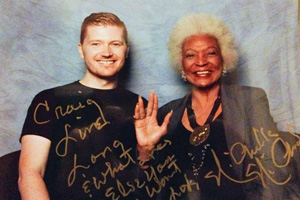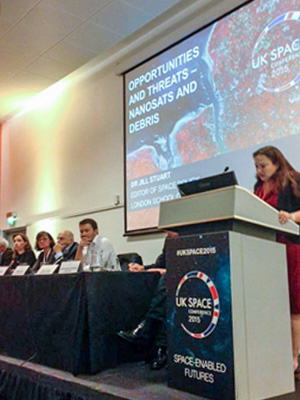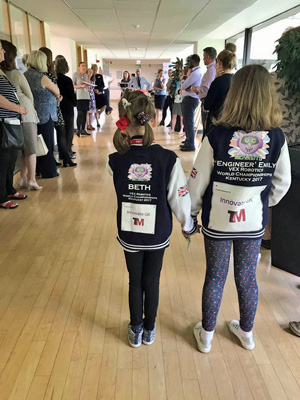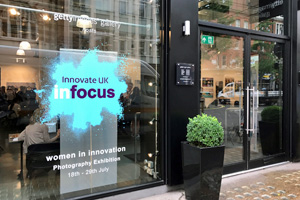Dr. Craig Brown is Innovation Lead, Space at Innovate UK, and a member of Innovate UK’s Space Applications Team, consisting of Innovation Leads in the areas of satellite communications, navigation and applications. His role includes the delivery of Innovate UK’s core programme of increasing innovation and growth within the UK space sector as well as engaging with SMEs (small to medium-sized enterprises) and universities to help them innovate and commercialise research. Craig is also a board member of Space and Satellite Professionals International and a member of the board of trustees for UK Students for the Exploration and Development of Space.

“…I would strongly advise speaking up and speaking out whenever you witness unfairness in the workplace…”
Space can be a very long game

I’ve wanted to work in space since I was a teen, an ambition partly inspired, I’m sure, by an enduring enjoyment of Star Trek! When my secondary school careers advisor asked me what I wanted to do when I left school I told her I wanted to design space missions, she replied with, “Don’t be so silly. Have you thought about becoming a teacher?” so naturally I figured out what a kid needs to do to become a space mission designer and I worked towards that goal.
My first job leaving university was a traineeship with the European Space Agency in space mission design, so I sort of ended up with my dream job pretty early! After that traineeship I returned to university to do a Ph.D., working on the BepiColombo space mission – which is only now being shipped to South America for launch, some ten years after I finished my Ph.D. – space can be a very long game!
I sort of knew after spending three years working at a university that I really wanted to return to a faster paced environment and happened to be in the right place at the right time with the right experience to get a job at Airbus designing new science and exploration missions for European Space Agency programmes.
I had a great few years working on some of the most exciting projects; an X-ray telescope called ATHENA, Mars Sample Return, missions looking for planets around other stars called PLATO and EChO … it was all very exciting. I realised that I was much more drawn towards new and exciting innovative ideas and got involved in fostering innovation inside the Airbus organisation.
That led to me being offered the role of Principal Innovation Engineer for Airbus Services, a more commercial role aiming to create new business from the space data generated by the company. After a few years of doing that I decided to make the leap out of the corporate world and into Innovate UK, the UK Government’s Innovation Agency, where I joined the Space Team as an Innovation Lead. I’ve had a very meandering career, from academia, to industry, to government.
Never a dull day
No two days are the same in this job! It’s what keeps it interesting. I am ‘field based’ which means I don’t have an office so I spend most of my days out and about visiting companies, organisations and universities with an interest in the space sector, helping them to develop the new cutting edge technologies that the sector needs to evolve, grow and remain relevant to the customers of the future.
The lion’s share of my job is spent looking after a very interesting programme with the European Space Agency, investing a large sum of money – up to £100m a year – with companies working in the satellite communications area. I listen to ideas and pitches, help companies identify the right support mechanisms for their technology developments and then invest in the best ideas which will most likely result in large return-on-investment to the UK tax payer through job creation and tax revenues. Never a dull day…!
Importance of diversity in the space sector
I think the space sector struggles with diversity. I would say that at the graduate level, yes, diversity is improving. Some of the best engineers I have worked with and worked for in the space sector have been women. In fact, nearly 50% of the Innovate UK space team are female.
The upper echelons of the space companies I deal with, though, are all dominated by white men. This is often reflected in the many, many space events I attend, where all too often we see panels of speakers with rarely a woman present. The worst example I’d seen of this was an event I recently attended where all THIRTEEN panellists in the closing session of a conference on High Altitude Platforms were men! It looked like the Last Supper! If diversity is important – and I strongly believe that it is – then the space sector really needs to up its game.
Diversity of thought isn’t important to innovation. It’s fundamental. You can think of innovation as a being a function of two things; invention, the generation of new ideas, and commercialisation, the ability to turn those inventions into self-sustaining products and services.
It’s hard to dispute that a diverse, broad range of ideas will result in more and better invention but it’s also become clear that businesses that promote and embrace diversity are also significantly more successful than those that don’t. Innovation massively benefits from diversity, therefore, as diversity doesn’t just lead to better ideas but will also lead to a greater likelihood of commercial success.
Advocating for gender balance

Gender balance is important to me on two levels. Firstly, from a business and economic growth perspective, it just makes sense. My job is all about growing the economy through innovation. If greater diversity means better business then I’m going to work to make that happen.
Secondly, and on a more personal level, it’s just something that feels right. I have always been someone that seeks a sense of fairness. For me, gender balance is just one facet of improving diversity, though, and needs to go hand-in-hand with improving fairness for other minorities.
The space sector in the UK is, for example, predominantly white as well as male. It would be great to see more action on improving racial and ethnic diversity in our sector. There is also a lack of visibility of LGBT+ men and women in the sector.
I’m also keen to help young people from disadvantaged backgrounds, too, so I volunteer as a mentor for the Social Mobility Foundation. I’d highly recommend checking them out. It’s a brilliant organisation that helps gifted teenagers from disadvantaged backgrounds get into good universities through its mentoring and work experience programmes.
Advice for other male champions of diversity
Good diversity programmes should have diverse teams but all too often men are either not invited to take part in them or do not volunteer. That’s despite a lot of men being advocates for diversity and fairness. Fixing this should help us fix some of the diversity issues facing us as a society, surely! So, my first bit of advice for men is to volunteer! It doesn’t matter if you haven’t been asked. I’m sure your assistance will be welcomed with open arms!
Secondly, I would strongly advise speaking up and speaking out whenever you witness unfairness in the workplace. I sit on the European Space Agency’s Satellite Communications Board, representing UK interests. A number of times I have placed on the record the UK’s disappointment in gender diversity at space conferences and events, for example. This sort of pressure will hopefully lead to change and, had I not spoken up, the lack of female speakers would have passed by without comment.
Consider giving up your speaker slot to excellent female colleagues. Recommend alternative female speakers and contributors and help address some of the more visible aspects of the gender diversity problem. Ask who else is on a panel before you agree to speak and consider saying no if there are no female speakers. Change won’t happen unless we make it happen.
Thirdly, men should talk about this to other men. Challenge misogyny when you encounter it and engage in debate when you hear people disagreeing with some of the positive actions being taken to address gender disparity. Sometimes men need to hear that the unfairness they are feeling is just a symptom of our male privilege being addressed – and when it comes from another man it probably gets a better hearing.
When I hear people say that the reason the conference agenda was full of men is because they were the best speakers, I challenge that thought. I’ve been to plenty of talks with bad speakers to know that they were certainly not the best speakers available..!
Having organised a number of conferences, I know first-hand how difficult it can be to get gender balance on stage. Sometimes you have to be forceful with companies you invite, insisting that they have to send a female speaker or else their invitation to contribute will be withdrawn – I’ve done this and it really does work!
It is absolutely vitally important that women accept invitations to speak at events, though, and I would absolutely encourage Womanthology readers to accept invitations that come their way. I have sadly had to resort to using my third-choice male back-up a few times in the past because my first and second choice female speakers were unavailable or unable to participate.
Board roles
I have a couple of board roles outside of work, although they are all complementary and related. I am a board member of Space and Satellite Professionals International, an organisation that supports individuals who have or are pursuing a career in the space sector. It’s a relatively young organisation in the UK, but it’s gaining some momentum.
We host interesting events and talks a few times a year as well as a lovely awards ceremony called Better Satellite World, which awards ideas and businesses using space and satellites to deliver world-changing services for public good. I’m delighted to say that in the two years of hosting this event in London, both recipients of the UK Space Personality of the Year went to female nominees; Catherine Mealing Jones, Director of Growth and the UK Space Agency, and Magali Vaissiere, Director of Telecommunications at the European Space Agency.
I lead on the skills agenda for the organisation, looking at how we can help develop the skills pipeline for the space sector – everything from inspiring children into science, improving take up of space jobs post-university and retraining of people from other sectors. Diversity, of course, plays a part in addressing the skills shortage in the sector.
I’m also a trustee of a charity called UKSEDS – UK Students for the Exploration and Development of Space. This is a student-run organisation which brings together space-themed societies from universities all over the country. It’s a brilliant example of how to create a university undergraduate network of like-minded students, sharing ideas and working together to shape the future of the space sector.
I have no doubt that the future leaders of the UK space sector are currently members of UKSEDS – and I’m very pleased to say that it’s a very diverse crowd! UKSEDS also runs a brilliant website called Space Careers – https://spacecareers.uk/ – the best place to go to look for graduate and entry-level jobs in the space sector.

I will be working with both UKSEDS and SSPI to help shape future thinking on addressing our skills shortage in the space industry, co-authoring a paper with Kathie Bowden, the UK Space Agency’s Head of Skills, to better understand the real underlying problems in our job pipeline. The space sector is growing and new job posts are being created at a rate that makes the posts hard to fill. Addressing some of the diversity barriers in our sector will no doubt be part of the solution.
Coming up next
Innovate UK is going through a period of interesting change. From this month, Innovate UK has joined the rest of the Research Councils in a new organisation called UK Research and Innovation, bringing the research communities and the business innovation communities closer together.
Our competition process will become broader and more open, meaning companies that struggled to fit their ideas into our previous competitions will be much better served. I’m also delighted that we have announced a second Innovate UK competition to specifically support female entrepreneurs in our Women in Innovation round 2 call! This call will look to support businesses in AI and data, clean growth, the future of mobility and the ageing society. www.gov.uk/government/news/women-in-innovation-new-support-announced – please do apply if your business fits the competition criteria!

Being involved in the first round of Women in Innovation has been one of my Innovate UK career highlights to date. It was truly inspirational to see the vast number of ideas submitted by such talented female entrepreneurs. Many of the women engaged through the process had never submitted ideas to Innovate UK for funding before. This competition proved that there are loads of excellent female entrepreneurs and business leaders out there so let’s find them and let’s support them!
https://www.gov.uk/government/organisations/innovate-uk
https://twitter.com/innovateuk
https://twitter.com/innovatecraig





